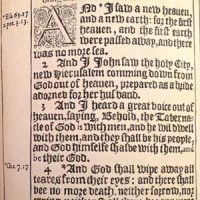The Holy Scriptures, Old and New Testaments, are the written Word of God, given by divine inspiration through holy men of God who spoke and wrote as they were moved by the Holy Spirit. In this Word, God has committed to man the knowledge necessary for salvation. The Holy Scriptures are the infallible revelation of His will. They are the standard of character, the test of experience, the authoritative revealer of doctrines, and the trustworthy record of God’s acts in history. (2 Peter 1:20, 21; 2 Tim. 3:16, 17; Ps. 119:105; Prov. 30:5, 6; Isa. 8:20; John 17:17; 1 Thess. 2:13; Hebrews 4:12.)
* Click here to jump directly to comment section, if you wish *
See also these Bible lessons from previous years:
(Brief excerpts given. See the URLs for much more.)
- How to Study the Bible – Index to the first set of lessons in our archives in 1996, which includes practical suggestions for Bible study.
- Thy Word Is a Lamp Unto My Feet: God’s Word For Today – Index to practical set of 13 lessons from 2007 examining the role of Scripture in the life of the modern Christian.
- Studies on Revelation and Inspiration – Series of 13 lessons from 1999 dealing with relevant topics such as what inspiration is, how inspiration works, the preparation and preservation of the Scriptures, languages and translations of the Bible, the Bible as its own interpreter, understanding biblical literature, and more. Author Leo Van Dolson.
- The Foundation of Our Assurance – In this lesson theologian Hans K. Larondelle focuses on the assurance, creative power, clarity and sufficiency of the Scriptures.
- God’s Two Book: Scripture and Nature – Lesson examines the relationship between nature and God’s written book.
- Scripture Twisting – Lesson examines relationship between Scripture, tradition, the Holy Spirit, misguided zeal and human intelligence.
The following related blog posts also address the subject:
Truth or Popular Opinion
And all the people who belong to this world worshiped the beast. Revelation 13:8 NLT Sadly many put their confidence in popular opinion, while the Bible tells us the vast majority of the world will worship the beast. Interestingly while Jesus claimed to be God, the majority accused Him of blasphemy and had Him crucified … Continue reading –>
Why Satan Has to Gaslight You
Monday’s section of this week’s lesson asks how we can keep from being deceived by Satan? Satan is a narcissist. Narcissists gaslight their victims by creating illusions that appear to defy what is true. Satan tempts us by creating illusions that appear to defy what is true. He has to make us doubt Bible truth … Continue reading –>
A Short History of the King James Version of the Bible
The King James version of the Bible is often considered the gold standard for modern translations, but few of us are familiar with its history, mandate, publication and early printing. This article provides a brief glimpse in the hope that we will understand it and its historical context a little better. The Bibles in Use … Continue reading –>
Three Logical Examples of Why It Is Reasonable to Believe the Bible
Last Sunday, at a graduation party, I visited with one of my former students from the Adventist school where I teach and give Bible studies. She is now attending a public high school in a different city, and she told me how sad she is that at least half of her school population is self-proclaimed atheist. … Continue reading –>
What I Hate About Memorizing Scripture
Every Jesus-follower knows that memorizing scripture is super important to spiritual growth. Paul the apostle said “the word of God is alive and active” (Hebrews 4:12). As such, when we memorize the words of this book we are memorizing living words. These living words have many benefits – such as power over temptation (Psalm 119:9, 11), … Continue reading –>
03: The Word: The Foundation of Revival – Thought Starters
“Plead my cause and redeem me; revive me according to your word.” Psalm 119:154 NKJV [Thought questions for The Word: The Foundation of Revival July 17, 2013] 1. Can the Bible revive us? If spiritual truth and power are contained in God’s Word, can reading Scripture draw us closer to the One who is Truth? … Continue reading –>
Thursday: The Word: Revival’s Guardian and Safeguard
The Holy Spirit mightily moved through the teaching and preaching of the apostle Paul as he established the Christian church in Ephesus. Ephesus was a city of approximately two hundred fifty thousand people. It was considered the market place of Asia. As ships brought their wares from throughout Asia, people flocked to Ephesus to buy … Continue reading –>
Tuesday: Jesus and the Word
How are the functions of the Word of God and the Spirit of God similar? Read John 5:39; 16:14-15. The Word of God bears witness of Jesus. The Holy Spirit also bears witness of Jesus. The Spirit leads us to a deeper experience with Jesus through His Word. The purpose of the Holy Spirit in revival is not … Continue reading –>
Monday: The Word’s Creative Power
Read Hebrews 4:12. The passage states that God’s Word is living, powerful, and sharper than a two-edged sword piercing our inmost being. How is God’s Word alive? What does that mean? In what way is God’s Word different than the intelligent counsel of any other wise teacher, pastor, or counselor? What do the following texts say … Continue reading –>
Sabbath: The Word: The Foundation of Revival
Read for This Week’s Study: Ps. 119:50, 74, 116; Heb. 4:12; 11:3; John 5:39; Heb. 4:1-2; Acts 20:27-32. Memory Text: “Plead my cause and redeem me; revive me according to Your word” (Psalm 119:154, NKJV). Just as serious Bible study spawned past revival movements, we believe that it will happen again in the last days. The Holy Spirit will move upon a generation of … Continue reading –>











I am confused, this testimony is powerful, but the Bible versus we quote from comes mostly from the New Translations, such as NKJV the NIV these Bibles leads the people astray from the Word. It brings confusion to the readers who read it, unless they only have been given a New Translation to read. See how many changes are made in this one verse if you compare the KJV opposed to the NKJV. Hebrews 8:10 in the KJV Bible: For this is the covenant that I will make with the house of Israel after those days, saith the Lord; I will put my laws into their mind, and write them in their hearts: and I will be to them a God, and they shall be to me a people: Hebrews 8:10 (NKJV)
10 For this is the covenant that I will make with the house of Israel after those days, says the Lord: I will put My laws in their mind and write them on their hearts; and I will be their God, and they shall be My people.
Here is a stern warning for all of us!
(Rev 22:19 KJV) And if any man shall take away from the words of the book of this prophecy, God shall take away his part out of the book of life, and out of the holy city, and from the things which are written in this book.
Another example is in the NIV; anyone please tell me what does the text say in Matthew 18:11 and how many verses are in Matthew 18 of the NIV?
It breaks my heart to see how easy we bring these New Translations into our houses, work place and churches, I notice the Sabbath school books and other material on the web quote mostly out of these New Translations, Why is that? (Matthew 24:4 KJV) And Jesus answered and said unto them, Take heed that no man deceive you. Are we being deceived by these New Translations?
The question concerning translations that you raise is important. There has been heated debate over new translations ever since there was one, including the KJV.
Many years ago one of my friends gave me a booklet titled, “God Wrote Only One Bible” which I no longer have. It was based on the premise that the KJV is the only true translation. On the other hand I have heard remarks concerning the KJV such as, “if it was good enough for Paul it’s good enough for me,” which point out that the KJV was translated after the Bible writers had been dead for 1500 years or so.
So why do I use another translation, rather than the standard King James Version? On the non-technical side the KJV uses antiquated English and if I am to adhere to the philosophy of people like Luther, Wycliffe, and Tyndale, then my Bible needs to be in the common language in use at the time. And that was also the reason the Jews created the Septuagint (Old Testament using Greek instead of Hebrew) some time before the first century AD. The Bible was meant to be understood by the common people. That is also why King James commissioned the creation of a new translation, the KJV.
Today the thee’s and thou’s, along with many words and spellings in the KJV are no longer in use, and in some cases word usage and phrasing has changed much over the years.
If we are going to ignore that the Bible is intended to be read by ordinary people, we could go back to the ancient languages which only a very few people can read and understand. But even then we would have the problem of which of the ancient documents or set of documents should be considered the closest to the original. And that is the same question we are having with the modern translations.
Furthermore, what most people don’t realize is that the King James Version which is so widely used today is not the original one published in 1611. It is the product of several revisions since the original, the last major one being in 1769, mostly to update changes in language.
For a good history of the King James Version check out Wikipedia’s article on that translation “Authorized King James Version” as opposed to the New King James Version which I prefer “New King James Version”. You might want to also look at Bible Version Debate which has a section in it on the types of translation.
At the Adventist Biblical Research Institute you can check out “Modern Versions and the King James Version” that discusses the question of versions and an article by Arthur White on “The E. G. White Counsel on Versions of the Bible” which is an article on why Ellen White sometimes used other translations.
The simple fact is that we do not have any of the original writings of the prophets and apostles – all we have are copies of copies. When the original KJV was published there were few biblical documents in Greek and Hebrew available, so a significant amount of the KJV was based on Latin translations. To quote an article by Arthur Ferch, “However, though Tischendorf’s citations are considered to be total and accurate, he was aware of only 64 uncials, one papyrus, and only a few minuscules. By contrast, we have today cataloged 257 uncials, 93 papyri, and 2,795 minuscules. This is evidence of the more accurate knowledge we can now have of the original documents of the New Testament” (http://biblicalresearch.gc.adventist.org/documents/Which%20Version%20Can%20We%20Trust.htm) (Tischendorf 1815-1874 at least 50 yrs. after the last major revision). That means that we not only have a better understanding of the ancient Greek and Hebrew in the Bible but also a clearer understanding of the relationships of the various manuscripts.
Furthermore, there is no such thing as a perfect translation. If I do my Bible study correctly then problems in translation vanish to almost nothing. I can take what I believe to be a bad translation, The New World Translation and prove every one of our doctrines using it.
We also need to understand that there was no punctuation used in the ancient languages so texts such as Luke 23:43 becomes a problem in all the translations because all of them were translated with theological bias which determines punctuation placement and sometimes word usage. Translating from one language to another is difficult enough by itself and is only compounded by a cultural and time gap of 2000 years. So when there is a question concerning what a manuscript says, translators necessarily go by what they think it says, and their thinking is formed by their theological background.
There is also the problem of the differences among the ancient documents–some of them big differences so that translators must decide which is the correct one. Texts are missing in the newer translations because the older documents that weren’t available to the KJV scholars don’t have those verses in them.
So, I use the New King James Version because it uses current English usage and it is very close in style to the KJV. so those with that older version can follow along better than if I used another modern translation. Furthermore, I believe it is translated with a better understanding of what the prophets and apostles actually wrote.
One person gives this good advice:
I want to know where in the Bible does it say that the Bible alone is the entire repository of God’s teachings. Does the Bible even mention the Bible? How did Christians worship in the early days after Jesus’ death and resurrection when people were illiterate and there was no printing press and the writings we now call the Bible hadn’t yet been reviewed and determined to be the Word of God? Who was it that looked at all the writings available at that time and discerned which ones were truth and which ones should be discarded as heresy?
Do the research and you’ll find the fullness of truth in The Catholic Church.
Thanks for your comment, John. As you may already know, the word “Bible” does not occur in the Bible. The word derives from a Greek word which simply means a collection of books. In the New Testament when the sacred writings are referred to, the writers use the Greek word “γραφη” which is usually translated as “Scripture” rather than “Bible.” Of course this was at the discretion of the translators to do so. Even today we sometimes use the words interchangeably. Usually, we understand these references in the Greek New Testament to be referring to the canon of the Old Testament since the canon of the New Testament had not been determined yet.
You are correct that the Bible is not the only repository of God’s communications with man. The Bible itself makes reference to certain writings that are not found in its pages. An example that immediately comes to mind is the Book of Nathan the Prophet which is referenced in 1 Chronicles 29:29. We might also note that apparently the earliest parts of the Old Testament were not written down until the late 2nd millennium BC. The assumption is that prior to that everything was passed on orally.
Regarding your question as to how people related to the sacred writings in the early days after Jesus’ death, we can find some answers from the Bible. A search for the word “synagogue” in a Bible concordance will reveal many instances where Jesus and Paul attended synagogue. The synagogues were centers of learning where children and adults both could learn to read and write Hebrew and study the Scriptures. Even outside of Israel, this studying was common and expected. Paul refers to the Bereans who studied diligently to learn the truth. (See Acts 17:10-11) It appears from this that the Scriptures were held in such high regard that the people went to great lengths to educate themselves in order to be able to study them. Even Jesus, a lowly carpenter’s son, was able to read from the scroll of Isaiah in the synagogue and was considered a teacher or rabbi. (See Luke 4:16-21)
The assumption that literacy was not widespread in Jesus’ time may be erroneous. While this was certainly true of the Dark Ages after the fall of Rome, there was an expectation for people to read. Jesus himself repeatedly used the phrase “Have you not read….” when addressing those who came to Him with questions. The Sanhedrin also seemed to recognize that literacy was fairly widespread. Why else would they concern themselves over the precise wording of the sign hung over Jesus on the cross? (see John 19:19-21)
Regarding the New Testament and how it came to be, as people related the story of Jesus, the accounts were written down. We don’t know when the first attempted narratives were written, but the ones we have in the Bible date from a few decades after Jesus’ death and resurrection. The letters of Paul and the disciples were also highly prized by the early church and some of those were included in the New Testament as well.
As far as who decided on the New Testament canon, the evidence is not clear. While Origen worked to establish a proper canon of accepted writings, the New Testament as we know it, was not established until later. At the time of Athanasius (later 4th century AD), his writings listed the books of the New Testament we are familiar with today, and he considered them to be the established canon. However, differences between the Eastern Church in Constantinople and the Western Church in Rome meant that the issue of what was included in the canon was far from settled. For instance the Council or Synod of Trullo, when Justinian II was emperor in Constantinople in the 7th Century, was rejected by Rome, in part because it approved a divergent canon.
Even Martin Luther, in the 16th Century, challenged the authenticity of certain books such as the Epistle of James. Perhaps the printing press that was largely responsible for the widespread distribution of Luther’s German Bible was also partly responsible for settling the canon we have now. The Roman Catholic church did not finalize their canon until the Council of Trent in the 16th century. The Eastern Church finalized theirs at the Synod of Jerusalem in the 17th century. The two canons are not identical.
With the exception of what are considered the apocryphal books, Protestant practice has been to recognize the same canon as that recognized at the Council of Trent.
Now, all that being said, I do not understand your final statement regarding “the fullness of truth in the Catholic Church.” It is a non-sequitur. The history of the establishment of the biblical canon does not establish the Catholic Church as “the fulness of truth” but rather as one faith group who holds a differing opinion about the canon from other faith groups. Certainly the Eastern Church at the very least would differ in opinion regarding your final statement. They were as deeply involved in determining the canon as the Roman Church was and their traditions are equally as ancient.
Please bear in mind that Protestants, which would include the Seventh-day Adventist church, proclaim that they differ from the Roman church over the issue of “sola scriptura” as opposed to Scripture plus tradition. In some respects that is paradoxical as the “sola scriptura” canon we use was developed by what became the Roman Church. We also must freely admit that some of our practices are informed by tradition and/or extra-biblical sources as opposed to Scripture. As do the Catholics, we find these sources interpretive in reference to present-day application of scriptural principles.
Unfortunately for every faith group, these interpretive applications tend to become set in stone over time and effectively become as non-negotiable as Scripture. Some examples for Catholicism might be Maryology, the use of the Rosary, and the Confessional. For some Protestants, it might be their liturgy or the frequency of Eucharistic practice.
I hope I have given adequate consideration to your comment. If I fell short, I apologize. May God inform both our understandings.
Thank you for your detailed reply, Stephen.
For the sake of our readers, I’d just like to add a little detail.
As you correctly note, Athanasius, then bishop of Alexandria, listed the canon of the 27 books of the New Testament in the late 4th Century, specifically in his annual Easter letter to his churches in 367 AD.
This was before the time of the Roman Catholic church–a time that might be called the time of the “catholic” church, with catholic meaning “universal” or “world-wide,” since Christianity had not yet fragmented into distinctly different bodies. To the best of my knowledge, the Roman Catholic Church was the first church to split off from the world-wide body of believers, the “catholic” church.
It is also true that the Roman Catholic Church developed from the traditions of the school in Alexandria, rather than the one in Antioch. But the canon of the New Testament was established before the time of a clear split. It’s difficult to pinpoint an exact date for the split, since the Roman Catholic Church claims all the early church leaders as the “fathers” and “saints” of the Roman Catholic Church, as well as the Apostle Peter himself, as the first “pope.” Other Christians rightly deny this claim.
Thank you for your input, Inge. According to documentation from the synods of Carthage, Pope Stephen 1, was already asserting pre-eminence as the bishop over the other bishops. They were protesting this assertion of authority. This was in the mid 3rd century, over 100 years prior to Athanasius’ festal letter. I do not see that Athanasius letter establishes the canon as it is only one of several competing lists in circulation during the 4th century. The Eastern Church did not even admit the Book of Revelation into the canon until the 5th century. I would interpret the fact that Athanasius’ list had the twenty-seven books we have today as coincidental.
It is also interesting to note that the papal legate from Cordova was the author of the creed accepted at the Council of Nicea in 325 AD. The church of Rome apparently had enough influence to accomplish that, much to the distress of the Arian opposition.
Even Paul recognized that “the secret power of lawlessness is already at work; but the one who now holds it back will continue to do so till he is taken out of the way.” (2 Thess 2:7 NASB) That tells us that Satan was working to corrupt and destroy through the use of human agencies as long as Christ’s church has existed.
Through it all, Christ worked to preserve His Word for His people, and He used all sorts of means. After all, if He could use Balaam’s donkey, He could use anyone. 😉
I suspect that Athanasius’s list may not be the first list of 27 book of the New Testament as we know it, but it probably the best-known early list. That there was continuing debate over the canon doesn’t mean that it was not already fairly well recognized, just as current debates over certain fundamental doctrines does not mean that they are not widely recognized.
The important take-away from this discussion is that the same God who inspired the writers of the Scriptures has worked to preserve them against all who would destroy them, including some who would later claim to have “preserved” the Scriptures after having kept them locked away from view for generations.
For what it is worth, I think the idea that God is preserving the Scriptures deserves more consideration than we often give it. Normally we think of God working through inspiration to produce the Bible and then go off thinking somehow that man alone decides which writings are canonized and how there are used.
To me we need to think in terms of the holistic involvement of God in dealing with the Scriptures. He first inspired people to write the words then He inspired people to collect the appropriate writings together and then finally He inspired people to safeguard those writings. But it doesn’t stop there either for He also inspires the readers of scripture to correctly interpret those writings. Truly, Jesus is, “the author and finisher of our faith” (Heb. 12:2 NKJV) who is, “upholding all things by the word of His power” (Heb 1:3 NKJV).
It’s interesting that you ask this because this summer I was asked the same question, but in this way, “You don’t read out of the NIV do you?”
I said yes, I was told of all the ways the NIV was not a good translation and in how many ways it offended the person asking me this question. Then, she asked me what I thought about what she had said. And I said, “Are you sure you want to know?” She said she did.
I said, “I think it’s a bunch of baloney and that some people just like getting worked up about things. And I think you’re making more out of it then there is to make.” I honestly said it out of love and I do love this person. But it did kind of make me chuckle a little bit to know it was such a big deal to her.